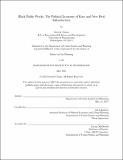| dc.contributor.advisor | Jackson, Jason | |
| dc.contributor.author | Ulama, Darryle | |
| dc.date.accessioned | 2022-04-08T13:37:14Z | |
| dc.date.available | 2022-04-08T13:37:14Z | |
| dc.date.issued | 2021-06 | |
| dc.date.submitted | 2022-03-14T16:39:33.330Z | |
| dc.identifier.uri | https://hdl.handle.net/1721.1/141797 | |
| dc.description.abstract | This thesis examines how New Deal public works intersected with race during a critical juncture in American political development and spatial rationalization. The narrative of the New Deal has often underestimated the infrastructure building that became the nucleus of the Roosevelt Administration’s relief and reform policies as well as the ways in which race and racism structured all levels of New Deal operations. This research highlights the promises and limitations of the “public works revolution” that the New Deal set in motion by exploring the extent to which New Deal infrastructure programs were redistributive along racial lines. Using archival records and agency reports, I offer programmatic histories of seven major public works programs and highlight the types of projects that were built in Black communities. I show how New Deal infrastructure building was layered with contradictions and punctuated with moments of progress as well as lost opportunities for redress. I then analyze public works spending in counties that had sizeable African American populations in the 1930s, including the Black Belt, Gulf Coast, and the metro areas of New York City, Chicago, and Philadelphia to show how state and local politics and the urban-rural line shaped infrastructure outcomes. Lastly, I apply mapping and spatial statistics to identify geographic patterns of public works expenditures across the country, which reveal that low per capita spending tended to cluster in regions with significant Black populations.
By focusing on the racialized dimensions of New Deal infrastructure building, this research challenges the logics that have been offered to explain public works in the fields of American political development, economic history, and fiscal federalism. This thesis also problematizes the redistributive impact of infrastructure on material and fiscal grounds by emphasizing how the policymaking and institutional legacies of New Deal public works are as consequential as their physical achievements. As the U.S. pursues ambitious infrastructure buildout in response to overlapping and unprecedented crises, new approaches to infrastructure policy are needed to fully realize their potential. | |
| dc.publisher | Massachusetts Institute of Technology | |
| dc.rights | In Copyright - Educational Use Permitted | |
| dc.rights | Copyright retained by author(s) | |
| dc.rights.uri | https://rightsstatements.org/page/InC-EDU/1.0/ | |
| dc.title | Black Public Works: The Political Economy of Race and New Deal Infrastructure | |
| dc.type | Thesis | |
| dc.description.degree | M.C.P. | |
| dc.contributor.department | Massachusetts Institute of Technology. Department of Urban Studies and Planning | |
| mit.thesis.degree | Master | |
| thesis.degree.name | Master in City Planning | |
